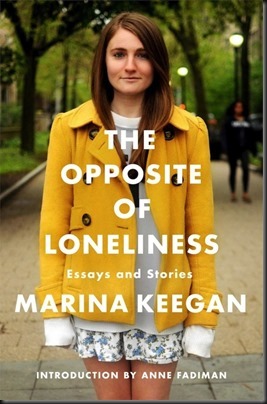You might have heard of Marina Keegan. Her Yale commencement speech went viral back in 2012. Five days after she graduated, she died in a tragic car accident at the age of 22.
I first heard about Marina at a house concert, when I saw Jesse Terry for the first time. During his set, he described how he happened across Marina’s speech and story. Being the troubadour he is, he was inspired to write a song, and he played it for us on that April afternoon.
It’s a beautiful song about loss, potential, and living life to its fullest. It’s a song about how even a stranger can impact your life.
Marina was a writer. At the age of 22 she had already been published in The New York Times and had received numerous awards. In her memory and honor, Marina’s professors and family decided to publish some of her written works in the book Opposite of Loneliness. It’s a book of short stories, both fiction and non-fiction. I’m always interested in reading about people who live their lives daringly, so I pre-ordered the book.
The book’s introduction by one of her Yale writing professors had me hooked. The way Anne Fadiman described Marina made me feel as if she were a kindred spirit: dedicated, motivated, stubborn to almost a fault. She details a story shared by Marina’s father, about Marina competing in a sailing contest in 40 knot winds. Marina started the race thinking she would win, because of her expert skills and lighter weight. Instead, it turned into a battle to finish. Adult men and women dropped out of the race, but 14-year-old Marina stubbornly finished, second to last…
Once I was in the book, the stories continued to pull me in. There’s depth and emotion in each story, but sadness permeates her fiction. Stories about relationships, even the successful ones, had darkness behind them. Many of the stories left me feeling unsettled. Some of them triggered long-lost emotions from my divorce. All of them made me feel something… And isn’t that what writing is supposed to do? Isn’t it supposed to take you on an adventure, both through a foreign land and through your inner landscape?
The non-fiction was, well, real. Her description of her high school car had me feeling nostalgic about my own first car. Her insights about the jobs Yale graduates take are insightful. The whale story is absolutely heart wrenching. I had to be careful where I read this book (e.g. at the laundry mat), because many of the stories moved me to tears.
It’s a good book.
In the introduction, Anne Fadiman said that Marina wouldn’t want to be remembered because she’s dead. She’d want to be remembered because she was good. But the thing is, she’s both.
Marina’s is a story that reminds me how fragile life is. Sometimes you are the passenger in a car, and the driver falls asleep at the wheel just because he’s tired. If it were you in that passenger seat, would you be Ok with the legacy that you left behind? We won’t all leave behind written works or other “permanent” sorts of things (e.g. art, songs) that will be shared with the world in the same way Marina’s stories have been, but as Jesse Terry sang, “Some things never will die.” Love, for example. Passion, authenticity…
Would I be Ok with the legacy I would leave behind? The answer becomes a stronger “yes” as the days go by…
I’m glad to have read Marina’s book. It’s a challenging read in many ways, but ultimately I’m glad to have the reminder that we get to choose to live the life we want, just as Marina chose to be a passionate writer.
Next time I see a satellite passing above, I’ll think of Dad and Marina.

I learned about Marina Keegan shortly after she died, when her essay for graduation went viral. I just bought her book and I am really excited to read it. I know this post was from awhile back, but I’m so glad you commented on it.
What did you think of her book?
I thought it was really good. I was moved to tears by some of the stories. Many of them touched a deep chord…
Comments are closed.